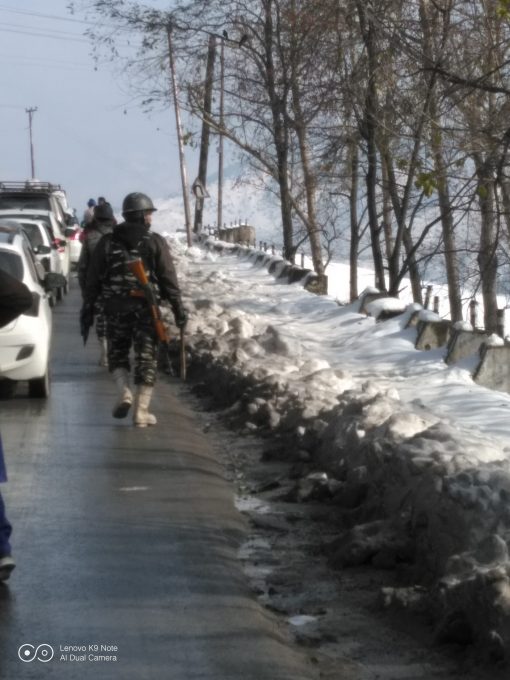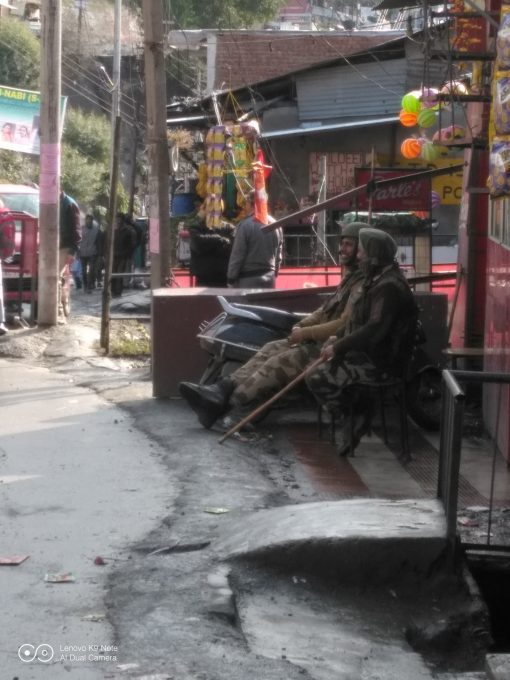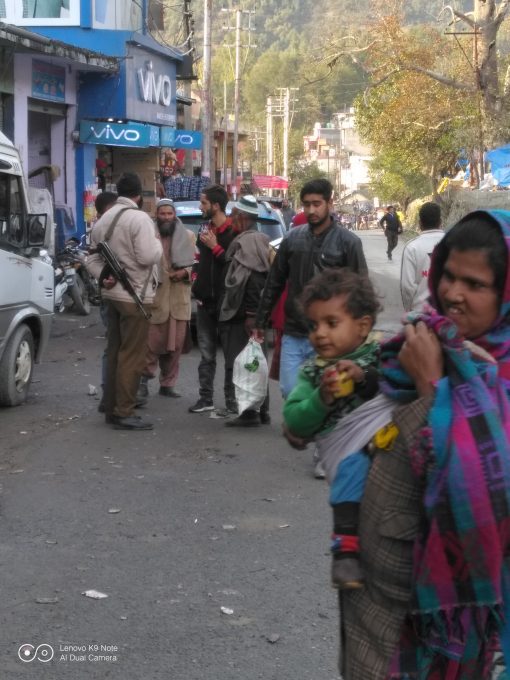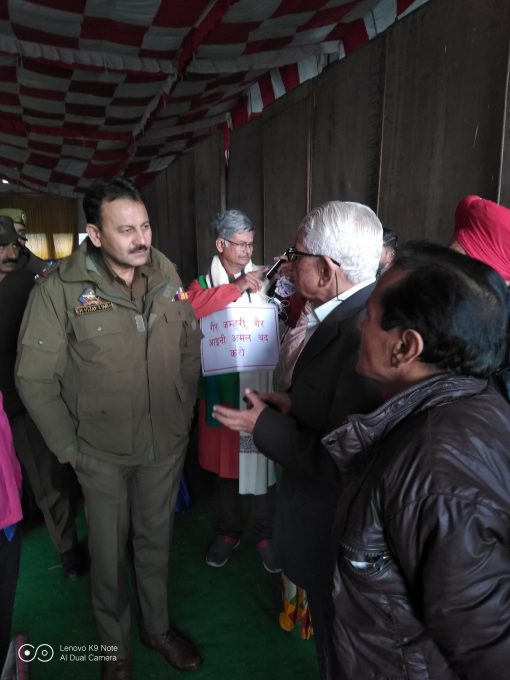
Civil society groups of different states organised a ‘Restoration of Democracy’ march from Jammu to Srinagar, protesting the abrogation of the special status of Jammu & Kashmir (J&K) from 26 November to 1 December. The march, conducted on foot and motorised transportation, included more that 50 people. It started from the Jammu Press Club amidst heavy police patrol. The police only allowed the marchers to proceed in vehicles from a nearby gurudwara. Prominent among them were Sheikh Abdur Rehman, former Member of Parliament (MP) from J&K and two-time Member of Legislative Assembly from Madhya Pradesh, Dr. Sunilam.
The group reached Udhampur later in the day and distributed pamphlets and interacted with the local community in the market. A press conference was planned for the next morning. However, the police came early in the morning and prevented it. Media persons were not allowed to enter the premises where the group was staying either. The Station House Officer (SHO) of Udhampur, Vijay Singh, citing government circulars and Supreme Court (SC) orders, prevented the participants from recording their interaction with the police as well. When asked to produce the said circulars and the SC orders, the SHO responded by saying “Don’t provoke me to take action”.
Also read | क्या धर्म के नाम पर किसी की जान लेना जायज़ है?
At the destination for the second day, Ramban, local political leader Amrit Varsha received the march with much fanfare. Slogans were raised for restoring the situation in Kashmir to before 5 August, the day the government of India abrogated Articles 370 and 35A and downgraded the region’s special status, besides creating two Union Territories, J&K and Ladakh. After a press conference, the group distributed pamphlets at the local bus stand and market and attempted small group discussions with the locals and held a public meeting at a community hall. Soon, the police deployment in the town intensified significantly and the force threatened journalists, snatched their equipment to prevent coverage of the event.
Around 8 to 10 people gathered around a member of the group who was distributing pamphlets in the market. The Station House Officer (SHO) of the J&K police of Ramban district, Vijay Kotwal, prevented any discussion on the contents of the pamphlet. The SHO also coerced locals to disperse, threatening them with arrest. The group were not permitted to speak to anybody in the market and distributed pamphlets under strict vigil by the police.

An elderly Kashmiri man started speaking about the history of Kashmir, expressing his pain and dismay with the abrogation of Articles 370 and 35A. He said, “I have lived all my life here and I belong to this place. Isn’t it gross injustice that some person in uniform from Madras or Bombay comes and asks me to prove who I am? Yet, I have to comply and show my identity cards whenever they ask.” He was carrying various forms of cards to demonstrate that he is indeed a citizen. Attempts to videograph his statement were quashed by the police. An officer verbally assaulted a group member and threatened him with arrest for “instigating the local community to speak.” The accusation by the SHO was baseless as the man who spoke in front of the camera spoke with consent and out of his volition.
Tensions started escalating and the police made sure that the yatra doesn’t continue to Srinagar as planned, on the pretext that the road to Srinagar was closed due to landslides until the following day. The road was indeed blocked due but locals reported that it was cleared within half an hour. The police ensured that no Ramban resident would host us yatris for that night. The police even told taxi and bus drivers not to ferry us to Srinagar, but only towards Jammu. So we had to return to Jammu and police vehicles followed us to ensure that we crossed Ramban’s district border into Jammu.
Also read | नागालैंड स्वायत्तता: कश्मीर के बाद, क्या भारत सरकार इस वादे से भी मुकर जाएगी?
Varsha, the political worker, was subjected to more harassment by local officials after the yatris departed and repeatedly questioned on our identity by the CID, the Army, and the Intelligence Bureau.
These hostilities point to nothing but a total breakdown of basic constitutional values. It can be directly inferred, solely from the constant surveillance and prevention of peaceful assembly, that how the Constitution’s right to equality, protection of freedom of speech and the right to life and liberty are routinely violated in this area. And, this was taking place in the Jammu region. Such violations and subversions of basic rights are much more severe in Kashmir.
In any case, most civilians we met were exasperated at the severe financial crisis they have been driven to, owing to the undemocratic decisions of 5 August.

Notwithstanding this, six of the marchers, including the two writers of this report, decided to attempt to reach Srinagar by shared taxi. We succeeded on our second attempt, on 29 November. In Srinagar, we met Communist Party of India leader Ghulam Mohammad Mizrab in his village, Poshpora in Shopian district, and activists of J&K Coalition of Civil Society, members of Haq Insaf Party in Srinagar and numerous civilians. We also interacted with security personnel deployed at short distances across the area, who are working in stringent conditions, facing long hours of duty which stretch over several months to years.
The most common sentiments expressed by people we met was of disappointment and anger at the how the Centre has handled the situation. Mizrab told us that earlier there were three kinds of people in J&K, those who had accepted being part of India, those who aspired for independence from India and Pakistan both and those who looked towards Pakistan with some hope. The latter two segments had realised over a period of time that their dreams were not practical and had shrunk in numbers.
For example, the total number of militants presently in J&K, according to government’s own figures, is not more than 300, for whom 8 lakh security personnel have been deployed and the government incurs an extra expenditure, other than salaries and upkeep, of Rs 3 crore a day. Most Kashmiri families now have some connection with India, either their children are studying in some educational institutions or they have business interests elsewhere in India. But after 5 August, when even the most pro-India leader Dr Farooq Abdullah was put under house arrest, the majority in Kashmir have turned against India.
Also read | Does the Appeal for Peace and Harmony Apply to the Hindutva Brigade as well for Future?
Mizrab says that even though he would prefer to be with India, he has been deeply hurt by the decision as he thinks it is taking away his identity in a way. A college teacher put it more succinctly: Articles 370 and 35A were like a nikah-nama, or formal marriage contract, between India and J&K, and the Indian government has annulled the marriage on 5 August. Thus the sense of alienation is complete. Another college teacher says that previously they were not so conscious of Indians coming to J&K but now they view them with suspicion. This is what the British rule was like for India.
Khurram Parvez of JKCCS informed that about 3.5 to 5 lakh migrant labourers have also been sent back to India before 5 August, just like the tourists, whose departure was publicised. It may not be a surprise that after some time Kashmiris may be blamed for this, just like they are blamed for driving out the Kashmiri Pandits, even though they were evacuated then, initially only for several months, on the pretext of some planned action against militants, both of which have now prolonged.
The group of marchers also saw vacant houses belonging to Kashmiri Pandits on the border of Shopian district and Pulwama, which keeps the option for them to return open, in addition to a colony established for Hindu government employees here. It does not appear that there is any problem in common Kashmiris belonging to any religion living together as they emphasise that their culture is Kashmiriyat and the variety of Islam practised here is Sufi.

The economic life seems to be limping back to normalcy, with business and economic activity going on for several hours during the day, but if you scratch the surface it becomes clear that the four-month-long clampdown has broken the back of the economy which has been further worsened by bad weather. The apple industry has suffered the worst. The producers could not meet the demands of buyers due to lack of labourers and restrictions in transportation. Apple orchards have been damaged due to early snowfall, and it will take about a decade for the trees to grow again.
It is being claimed that the larger Hindu population in Jammu is happy, but the the economy of this region is tied with Kashmir and has also suffered badly. People in Kashmir now want to bypass Jammu and do business with other regions of the country.
Some yatris visited a public school in Srinagar. The school had about 10 teachers and staff members sitting in a room, however, all classrooms were locked and there was not a single student to be seen. The teachers here and in several other schools told us that there have been no classes since 5 August. When one of the yatris took a photograph of a locked classroom, the teachers panicked. They would not let us leave until they deleted the photograph from his mobile phone. This was their fear: “Aap marwaayenge hamein. Government pehchan legi ki yeh kaunse school ka classroom hai aur phir hamein nahin chhodenge—you will have us killed. The government will be able to identify the school from the photo and not spare us.” This was an eye-opener about the extent of fear prevailing in the Valley.
Also read | Why is IIM Ahmedabad ignoring the caste reality of India?
Despite tall claims of the Home Minister, except the Board examinations, the question papers were taken by teachers to homes of students of all other classes and answers brought back to the school. Parents have been forced to hire the same teachers to provide their wards home tuitions, which costs up to Rs5,000 for a child in Class VI or VII. Naturally, the poorer sections cannot afford to continue their children’s education. Further, students of private schools have to pay fees even though their schools are not open. A class XI student lamented, “Even though only 50% of the board exam syllabus was completed, we have to study on our own and write the exam.” No college is functioning, barring for examinations.
The most serious damage has been done to the region’s politics. There is no sign of revival of political process. While the Bhartiya Janata Party has realised the political agenda of Rashtriya Swayamsevak Sangh in J&K, it is preventing other parties from carrying out their activities. There is a ban on political activity, especially related to Articles 370 and 35A. Government employees have been made to sign an agreement to be part of one of the two Union Territories. The people who were arrested are being released after 10-15 community members sign bonds guaranteeing that they will not participate in any activity opposing the abrogation.
The government does not want any other voice to be heard other than its own. Most newspapers are carrying government advertisements or reporting government and apolitical events. The media is totally censored. The bureaucracy and security establishment is dominating the politics. There does not seem to be any hope for restoration of democracy yet. Senior activist of JKCCS Pervez Imroz asks how can there be democracy in a situation of occupation?
Former MP and former MLA Sheikh Abdur Rehman sought an appointment with the Lt. Governor to discuss the details of the march. The officials at the Lt Governor’s office declined giving him an appointment on the phone and instead asked him to send an email. Two critical things need to be highlighted about this. First, there is a complete blockage of internet facilities in J&K, so it is unclear why officials expect an email. Second, and more egregious, is that the email address provided by the officials was incorrect. This raises pertinent questions about democratic accountability and access. There is little hope that the aam aadmi will have any dialogue with people in power under these circumstances.




